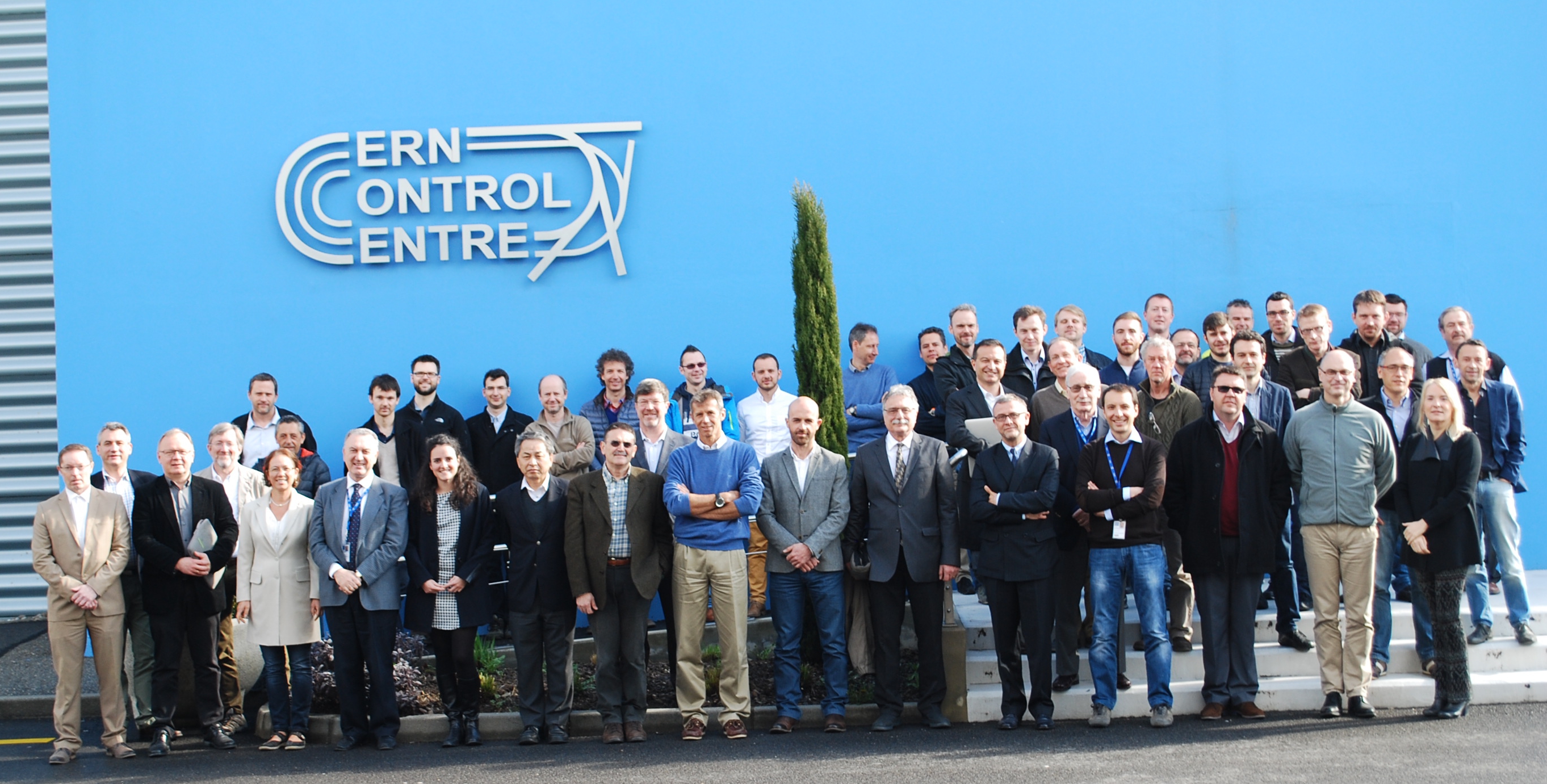Review of the 11 T Dipoles at Collimator Section for the HL-LHC
Various rooms
CERN
HL-LHC is in the final stage of design and prototyping: all technologies for the hardware upgrade must be fully proven by beginning of 2017. This review covers the 11T dipole, planned to substitute the LHC dipole cryo-magnets in the Dispersion Suppressor, with a new unit producing the same integrated field, requiring a bore field in the range of 11 T, and an integrated by-pass for a collimator. Previous technical reviews addressed the engineering concepts, and cost and schedule (within the overall scope of HL-LHC).
The scope of this review is to examine:
- Magnet design status, with special attention to the cold mass, its cryostat and electrical, hydraulic, mechanical, vacuum interfaces and integration in the LHC continuous cryostat and LHC arc circuit;
- By-pass and collimator design;
- Results of model magnets;
- Status of prototype magnets;
- Conductor performance, procurement status and plans;
- Status of production tooling, finalization of design and procurement;
- Components procurement, status and plans;
- Test plan, QA/QC, and safety aspects;
- Production schedule and global plan to installation (including constraints given by LS2).
Review panel: Akira Yamamoto (KEK-CERN, Chair), Giorgio Apollinari (Fermilab), Arnaud Devred (ITER), Pasquale Fabbricatore (INFN), Joe Minervini (MIT), Pierre Vedrine (CEA).
Jean-Philippe Tock (link person)
The review is scheduled on 6th to 8th April 2016, at CERN.

-
-
08:30
→
09:00
-
09:00
→
10:00
- 09:00
- 09:10
-
09:30
Introduction and new 11 T plan in HL-LHC 25mSpeaker: Frederic Savary (CERN)
-
10:00
→
10:20
Coffee break and group photograph 20m
-
10:20
→
12:30
-
10:20
Cryo-assembly and by-pass cryostat design 35mSpeaker: Delio Duarte Ramos (CERN)
-
11:00
Coil winding and collaring 25mSpeaker: David Smekens (CERN)
-
11:30
Cold mass assembly design 25mSpeaker: Herve Prin (CERN)
-
12:00
Magnet powering and operation requirements 25mSpeaker: Samer Yammine (CERN)
-
10:20
-
12:30
→
14:00
Lunch break 1h 30m
-
14:00
→
15:50
-
14:00
Model magnet test results and analysis at FNAL 35mSpeaker: Alexander Zlobin (Fermilab)
-
14:40
CERN superconductor and cable design performance 25mSpeaker: Bernardo Bordini (CERN)
-
15:10
Model magnet production and plan 35mSpeaker: Juan Carlos Perez (CERN)
-
14:00
-
15:50
→
16:10
Coffee break 20m
-
16:10
→
17:40
-
16:10
Model magnet test results and analysis - Quench performance vs mechanics and operation requirements 25mSpeaker: Gerard Willering (CERN)
-
16:40
Model magnet test results and analysis - Protection and operation requirements 25mSpeaker: Susana Izquierdo Bermudez (CERN)
-
17:10
Model magnet test results and analysis - Magnetic measurements and operation requirements 25mSpeaker: Lucio Fiscarelli (CERN)
-
16:10
-
17:40
→
18:30
-
19:00
→
20:30
Working Dinner (upon invitation) 1h 30m tbc
tbc
-
08:30
→
09:00
-
-
08:30
→
09:00
Panel closed session 6/2-024 - BE Auditorium Meyrin
-
09:00
→
10:10
-
09:00
Magnet production : agenda of the day 10mSpeaker: Frederic Savary (CERN)
-
09:10
Safety and codes 25mSpeaker: Thomas Otto (CERN)
-
09:40
11T QA 25mSpeaker: Rosario Principe (CERN)
-
09:00
-
10:10
→
10:30
Coffee break 20m
-
10:30
→
12:45
-
10:30
Superconductor production plan, QA/QC 15mSpeaker: Bernardo Bordini (CERN)
-
10:50
SC cable production plan, QA/QC 15mSpeaker: Jerome Fleiter (CERN)
-
11:10
Collared coil procurement, status and plan, QA/QC 25mSpeaker: David Smekens (CERN)
-
11:40
Cold mass procurement, status and plan, QA/QC 25mSpeaker: Herve Prin (CERN)
-
12:10
Quality control tests throughout production – Factory acceptance tests 25mSpeaker: Arnaud Pascal Foussat (CERN)
-
10:30
-
12:45
→
14:00
Lunch break 1h 15m
-
14:00
→
15:25
-
14:00
Cryostat procurement, status and plan, QA/QC 25mSpeaker: Delio Duarte Ramos (CERN)
-
14:30
Vacuum and cryogenics systems procurement : status and plan, QA/QC 10mSpeaker: Cedric Garion (CERN)
-
14:45
Powering and other systems procurement : status and plan, QA/QC 10mSpeaker: Hugues Thiesen (CERN)
-
15:00
Final acceptance tests – test bench readiness 25mSpeaker: Gerard Willering (CERN)
-
14:00
-
15:25
→
15:40
Coffee break 15m
-
15:40
→
17:00
-
15:40
New cross-section and its rationale 25mSpeaker: Emelie Kristina Nilsson (CERN)
-
16:10
Feedback on the recommendations from the previous review 25mSpeakers: Alexander Zlobin (Fermilab), Frederic Savary (CERN)
-
16:40
Tooling status 15mSpeaker: Friedrich Lackner (CERN)
-
15:40
-
17:00
→
17:30
-
17:30
→
18:00
Panel closed session 6/2-024 - BE Auditorium Meyrin
-
08:30
→
09:00
-
-
08:30
→
09:00
Panel closed session 180-1-N51-Meyrin
180-1-N51-Meyrin
CERN
-
09:00
→
09:45
Visit of Large Magnet Facility (for reviewers and speakers only) 45m 180-Meyrin
180-Meyrin
CERN
-
09:45
→
10:00
Coffee break 15m 180-1-N51-Meyrin
180-1-N51-Meyrin
CERN
-
12:30
→
13:30
Lunch break 1h
-
13:30
→
16:30
-
16:30
→
17:00
Close-out session 30/7-018 - Kjell Johnsen Auditorium
-
16:30
Close-out 30mSpeaker: Prof. Akira Yamamoto (High Energy Accelerator Research Organization (JP))
-
16:30
-
08:30
→
09:00